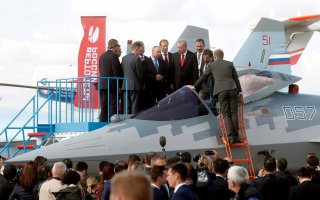Could Turkey's Purchase of Russian Stealth Fighters Spell the End of NATO?
It remains unclear whether this proves to be a mere bump on road or will mark the beginning of a permanent reorientation in Turkish defense priorities.
Key Point: Ankara’s revived interest in Russian military hardware comes during a time of acute strain in Turkey-NATO relations, an opening that the Kremlin has effectively been working to exploit.
Turkey’s plans to purchase the Russian S-400 missile system marked a major shift in Ankara’s defense orientation, eliciting a sharp response from Washington. Nonetheless, the S-400 deal barely scratches the surface of the blooming Turkey-Russia defense relationship and the threat that it poses to NATO’s military coherence.
The Kremlin and Rosoboronexport-- Russia’s state arms exporting agency—are seeking to capitalize on the political goodwill from the S-400 sale with several other high-profile contracts, including Russian jet fighters and next-generation missile defense system. When the US defense department suspended F-35 transfers to Ankara “pending an unequivocal Turkish decision to forego delivery of the S-400” early last month, Russian and western defense commentators speculated that Russia would pounce with a snap Su-35 offer. It now appears, however, that Moscow has its sights set on a bigger deal. In an interview given to Turkish state media, Rostec chief Sergei Chemezov suggested that Moscow is open to inking a Su-57 contract: "These fifth-generation Russian fighter jets [the Su-57] have outstanding qualities, and show promise for export."
As if to lay on Moscow’s intent even more thickly, Chemezov added that Russia is “ready to cooperate” on a potential Su-57 sale so as to "support Turkey’s desire to develop its own defense industry." This proposal echoes similar Russian overtures to China and India, reflecting Russia’s export-driven developmental strategy for the Su-57 platform. Turkish President Recep Erdoğan’s government has yet to comment on the prospect of purchasing the Su-57. The question of time preference—that is, how long they are willing to wait to receive their order—may figure prominently into Turkey’s decision. Given that the Su-57 is just now beginning to be slowly serially produced, the Turkish Air Force is unlikely to receive their first batch of Su-57’s until at least early 2020. Meanwhile, the F-35 is not only widely available for export but produced, in significant part, by Turkish firms based in Turkey.
Ankara has been less ambivalent in expressing its interest in Russia’s upcoming S-500 air defense system. “We concluded the S-400 issue, signed a deal with the Russians and will start co-production. Later, we may work on S-500s,” announced Erdogan in a recent interview. To be sure, such a purchase wouldn’t be without a clear military rationale. Having already bought into the Russian missile defense ecosystem with the S-400, it could make technical sense for Turkey to consider upgrading to its successor for the sake of systems coherency if nothing else.
Even so, the Turkish defense sector is well versed in leveraging Russia and the west against one another in pursuit of favorable import terms. For Ankara, these sorts of glib proclamations may be less of a concrete statement of intent to buy Russian hardware and more of a bargaining chip in future arms negotiations NATO. As with the successfully negotiated S-400 contract, Rosoboronexport can be expected to offer the S-500 at a fraction of the price commanded by its American counterparts.
The American defense industry is not wholly without countermeasures against Russia’s aggressive pricing model; in particular, Washington can offer Ankara the competing Patriot missile system at a discount. This is easier said than done, however; prospective subsidies must be negotiated with Raytheon (Patriot’s manufacturer), and a selective concession to Turkey may set a dangerous precedent for prospective F-35 clients to seize upon.
Ankara’s revived interest in Russian military hardware comes during a time of acute strain in Turkey-NATO relations, an opening that the Kremlin has effectively been working to exploit. It remains to be seen whether this proves to be a mere bump on road or will mark the beginning of a permanent reorientation in Turkish defense priorities.
Mark Episkopos is a frequent contributor to The National Interest and serves as research assistant at the Center for the National Interest. Mark is also a PhD student in History at American University. This article first appeared in 2019 and is reprinted due to reader interest. Image: Reuters.

